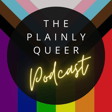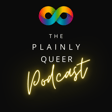
Special Guest Silva Neves
On this episode of The Plainly Queer Podcast, we welcome our guest Silva Neves, a psychosexual and relationship therapist and supervisor and a pioneer in GSRD (Gender, Sexual and Relationship Diversity) training in the UK and beyond. Silva is the author of Compulsive Sexual Behaviours and co-editor of the books Erotically Queer and Relationally Queer, both Pink Therapy guides for practitioners.
In the episode, we discuss issues affecting the Queer community, including the current rise in homophobia, transphobia and biphobia in our society. We touch on serval topics from Erotically and Relationally Queer, such as Queer sex, religion within the Queer community and shame, to name a few. Join us as we explore what it is to be Erotically and Relationally Queer with guest Silva Neves.
Reading list:
Erotically Queer. A Pink Therapy Guide for Practitioners. Edited by Silva Neves and Dominic Davis. ISBN 9781032197319
Relationally Queer. A Pink Therapy Guide for Practitioners. Edited by Silva Neves and Dominic Davis. ISBN 9781032197241
Compulsive Sexual Behaviours. A Psycho-Sexual Treatment Guide for Clinicians. Silva Neves. ISBN 9780367465483
Please note that this episode discusses potentially distressing topics. Engage mindfully and seek professional help if needed.
Thank you for being part of our Plainly Queer community.
Below is a list of resources that may be of help to anyone listening:
Queer affirming counselling and psychotherapy services: https://www.insightmatters.ie/
LGBTQ+ community support in Ireland: https://lgbt.ie/
LGBTQ+ Youth Support in Ireland: https://www.belongto.org/
Transgender Equality Network Ireland: https://teni.ie/
The Samaritans: https://www.samaritans.org/ireland/samaritans-ireland/


